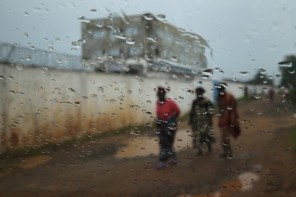Update: For a broader look at constructing a relationship between readers and writers when covering rape and trauma, see my January/February 2011 article in the Columbia Journalism Review (PDF here with permission).
For some suggestions on meaningful consent in trauma journalism, see this post.
Whether we should tweet rape is a question that seems to continue to bother people, on this blog and elsewhere. Here I’m collecting some of the ideas these posts have sparked, here and elsewhere. Beyond whether we should live-tweet an interview with a rape survivor, this has raised what I think are compelling points about basic journalism practice, from what counts as consent to how we foreign journalists evaluate our turf and to whether journalism, when rendered in real-time, imparts an ethical obligation to readers.
Here are some of the themes that came up in the comments here and elsewhere:
Does “sure, write about me” count as consent if someone has just been raped?
TexasinAfrica (a political scientist) suggests that women who’ve just been raped may not be capable of offering consent. Clara (a journalist, not the Clara who edits MoJo) says, “Can a woman just raped and mutilated — no doubt in not just emotional but physical shock — consent to anything? It’s a medical fact that a trauma victim might not be in full control of her emotion, or fully aware of the emotional consequences of the rape, let alone the consequences of an interview about the rape. A recently raped woman hasn’t had much counseling on the subject.”
How do journalists contextualize consent?
McClelland tweeted after the fact that part of her efforts to get consent involved working with a local Haitian NGO and choosing a woman whose story is already “out there” via a TV interview. That’s a great place to start, of course — local actors know the context better than foreign journalists do. (Of course, how we vet local actors is another question.)
But even they can make mistakes. This, from a columnist praising the twitter feed: “Note: Many of McClelland’s original tweets display K.’s full first name. However, The Institute for Justice and Democracy in Haiti (the NGO McClelland is working with) retroactively asked that K.’s full name be redacted. In the interest of K.’s safely, we have also complied.”
Is consent the same across all technologies?
Then there’s the issue of technology and consent: Can sources consent to disseminating their story on media they don’t use, or don’t know, or don’t understand? This isn’t just an issue for Twitter. It’s come up as an issue in online reporting, video reporting and even with that most old-fashioned of technologies: the newspaper.
How do you make sure a source understands what they’re consenting to? When readers reacted critically to his decision to name a nine-year-old Congolese rape victim in his NYT column, Nicholas Kristof explained, “I did get consent from [the girl] and her aunt. It’s true that there in circumstances like that, there are always uncertainties about how meaningful consent is. I went out of my way to explain what I was doing and show her what the video would look like, but you’re right that consent is a fragile concept in a context like that. For me, the crucial factor, beyond consent, was that there seemed zero chance that the article would come back and haunt her.”
Readers had another concern, though: The longevity of the Internet, the consequences of which many rural interviewees may not entirely fathom. Reporting from the field on rape in Liberia, Glenna Gordon makes an eloquent argument about the need to understand the difference between what we know about how the Internet works and what our wiling sources understand about the eternity of digital footprints.
I think there’s no good answer to this one, no one rule for “best practice.” But I think asking these questions, again and again, is important. That is the practice.
What does the medium do to the message?
Clara says, “It’s all undigested upset from all angles. Unedited, un-contemplated. Great, if you’re narrating the fall of the world trade center; not so great with the very personal disaster of a human who can’t even talk because her tongue was just bitten off in a rape.”
On the other hand, Phil Bronstein, media critic over at the San Francisco Chronicle, says journalists should embrace change. He says many of us journalists consider technology “like spinach” and argues that “[t]he personality and speed that good tweeters bring to a story – breaking or otherwise – is a tool we should all be using more often.”
Who’s story is it, anyway?
Glenna Gordon says in comments, “There’s such a big different between, ‘listen to me telling this story’ and ‘listen to this story.'” Is the journalism about the subject, or the journalist? Carmen Sisson asks a similar question, with some brutal honesty, and wonders whether all this personality-driven journalism is more than a method of “fetish[izing] writers.” And Bronstein says that the rape tweets “have what we now call ‘personality, ‘attitude’ and ‘voice,’ meaning they’re personalized and help establish the reporter as her own ‘brand,'” which he seems to believe is a good thing. It can be — think about all the international news you watched in the late 1990s not because you cared about, oh, Turkmenistan, but because it was Christiane Amanpour doing the interview — but not, I think, always and unequivocally.
Is all speech equal?
Thib (an anthropologist) says, “Twitting an informant’s speech live is akin to putting the informant on public stage or live television without giving the informant the benefit of the spatial cues and social dynamics that would indicate this is a live event.”
I find this fascinating because it forces me to think about something journalists often don’t: Telling a story is a social act. That’s part of what makes the role of a journalist so delicate — we’re the megaphone that brings the interview — which may seem, to our sources and sometimes to us, like a private encounter — to the public. Preparing trauma survivors for the social dimension of their story-telling, reiterating the risks of that and re-confirming their decision to participate in this social act is an obligation…an obligation I personally feel the journalist pursuing a trauma story owes above even her obligation to her editor, her newspaper or magazine, or her reader. That’s an individual matter, but the gravity of the obligation is probably something about which we all can agree.
Would ‘we’ live-tweet an interview and doctor’s appointment with an American rape survivor?
Clara points out, “[K]’s story ought to be told in a fair way. And it’s hard to imagine the live Twitter feeds could have had the kind of stamp of consent journalists would be expected to get in the US from a rape victim – nor that cushion the conscionable person needs to feel they’re having an honest read and not a peep-show. Would McClelland, or you, or I be able to “consent” to the same type of journalistic treatment if we’d just been raped, mutilated and approached by a stranger to explain ourselves? That’s the kind of question that plagued me as I read the Twitter story of [K] — and I didn’t trust it.”
This is another similarity to the Kristof controversy, in which many readers flatly (and in my view rightly) asserted that no American newspaper would ever publish the name, let alone show the face, of a 9-year-old American girl who’d been raped. So why, those critics asked, are the rules more lax in developing countries?
What happens after the interview/Tweeting/broadcast is over?
Robyn, an ex-journalist of 15 years and now an aid worker, says, “In some cases public testimony is empowering, while in others, encountering replays of the interview or the response of people who heard it or just the survivor’s resulting loss of control over who knows can be crippling.” She also advocates that journalists consider the need of survivors for follow-up services after retelling such a story.
Should trauma journalism require special training?
Robyn says yes. “I would call on all responsible journalists to insist on being provided – or for those working independently, taking the responsibility upon themselves to obtain – some basic training on trauma and dealing with survivors. Even a relatively short introduction can be invaluable in equipping you with the knowledge you need to avoid inflicting a great deal of unnecessary harm on the people you might encounter in the wake of armed conflicts, natural disasters or other personal tragedy.”
No one made a case on the other side in the comments, although I am sure a compelling one can be made — especially since we journalists, as a breed, resist the idea of certifications and pre-requisite credentials. And of course many a fine journalist has done sensitive, ethical work without training. It’s probably obvious, though, that I’m in the “call the Dart Center” camp.
Enough about the writer. What are the ethical obligations of the reader?
McClelland and Jeffery reiterated, in different fora (see below), that concerned readers should get in touch with the reporter or editor for clarification in these kinds of situations. I would argue that a real-time journalism “experiment” (to borrow from Jeffery’s words to Bronstein) should anticipate real-time reader reaction. Indeed, as reader Janie pointed out to me on Twitter, a reader who felt strongly enough about the issue would do best to try and intervene as the real-time story unfolds.
Janie’s point raises a bigger ethical question that no doubt will come up again and again as new media/social media give us more immediate tools: What are readers’ obligations to the journalism they see unfolding before them?
Post-game roundup
Like Bronstein, I too have switched to using “K” instead of the woman’s name, after the NGO the reporter worked with asked her not to use the woman’s full name. I hope readers will do the same.
Mac McClelland tweeted, after the Twitter experiment was over, with some background on her reporting. Reader Janie has reconstructed Mac’s post-interview twitter feed for us in the comments here. Clara Jeffery, co-editor of Mother Jones, also posted those tweets on The Atlantic Wire.
If you want still more, this issue got picked up, with perspectives both in favor of and opposed to the experiment, on The Atlantic Wire, SF Chronicle and Salon. Jeffery spoke with the Chronicle; McClelland spoke with Salon.
So…now what?
Thoughts from all sides, perspectives and professions are welcome. There are multiple posts about this issue, but I’d appreciate it if you can put your comments here. I’m trying to make this as easy as possible for readers — and for commenters, who get an email every time a new comment goes up.
And keep in mind that if you do comment you’ll get emails every time someone else does, too. I’ll try to figure out how to make that not automatic but something you can opt in for if you want to, but my WordPress learning curve can be steep, so I appreciate your patience. Also keep in mind this is a moderated blog. My comment policy is available here, but I’ll just add that if the conversation seems to have run its course, I’ll close the comments section, with a quick note to let you know that’s happening.




Re: “as reader Janie pointed out to me on Twitter, a reader who felt strongly enough about the issue would do best to try and intervene as the real-time story unfolds”.
Jina, don’t twist my words to suit your current blog post on this subject !
That is distorting what I said.
My direct comment to you was why didn’t you, Jina, call someone at Mother Jones while it was happening and ask to speak to the editor. In your bio, you state the following: “I’ve also published in the online versions of Mother Jones”, so I would assume you know at least one editor there.
My other comment was to Thib when one day after the live tweet he wrote the following:
“It still makes not (sic) sense for why McClelland is twitting the story although the concern for twitting has shifted a bit”.
And also this:
“It highlights some of the egoistical aspects (and therefore problems) of twitting live when a large tint of that interest in twitting is the “hey look at me! I’m talking to a rape victim! LOOK!”
Two other comments by Thib ( again)include :
“I have lost trust in McClelland”. and his very dramatic plea: “Why, McClelland? Why?”
I replied to Thib’s 8/19 ( one day after the live tweet) comment with the following:
“That would be absurd.
If this really disturbs you, why not contact the reporter directly”.
Again, Jina, don’t twist my words.
I apologize if you feel I misrepresented what you said. As I clarified twice before, and will now again, I did make that call — and as I said in the blog post, I think that your call for reader intervention raises an important question for journalists and readers, and one that will no doubt become more important as social media plays an ever-increasing role in reporting, which I expect it will.
Social media can — and often aims to — change readers from passive to engage, from receivers of information to participants in a conversation. I’d love to hear from readers whether they feel the immediacy and interaction of social media alters their obligation as readers (or creates one?). And although it sounds as if you didn’t mean to raise precisely this point, I’m glad, Janie, that you inspired it, as I think it’s important for both readers and writers to consider.